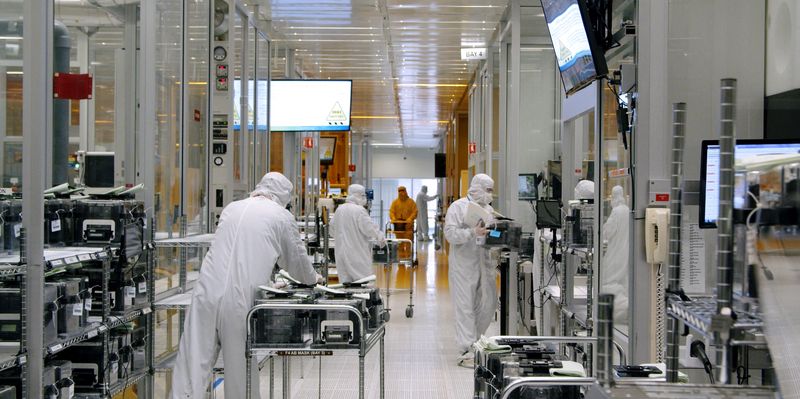By David Shepardson and Patricia Zengerle
WASHINGTON (Reuters) -The U.S. Senate on Wednesday passed sweeping legislation to subsidize the domestic semiconductor industry, hoping to boost companies as they compete with China and alleviate a persistent shortage that has affected everything from cars, weapons, washing machines and video games.
The House of Representatives plans to vote on Thursday on the long-awaited bill after the Senate passed it on a 64 to 33 bipartisan vote. If approved as expected, President Joe Biden plans to sign it into law early next week.
The "Chips and Science" act provides about $52 billion in government subsidies for U.S. semiconductor production and an investment tax credit for chip plants estimated to be worth $24 billion.
The legislation would also authorize more than $170 billion over five years to boost U.S. scientific research to better compete with China. Congress would still need to pass separate appropriations legislation to fund those investments.
"This legislation is going to create good paying jobs, it will alleviate supply chains, it will help lower costs, and it will protect America’s national security interests," the Senate's Democratic majority leader, Chuck Schumer.
Senator Mark Warner said the bill would help fund 10 to 15 new semiconductor factories. "If we had not done this, there would not be another American semiconductor manufacturing plant ever built in this country," Warner said.
Others noted China had lobbied against the bill.
"This is a bad day for President Xi and the Chinese Communist party," said Senator John Cornyn. "The slumbering giant that is America has finally awakened to the challenge that we face from the People's Republic of China."
The Chinese Embassy in Washington said China "firmly opposed" the bill which it said was "entrenched in the Cold-War and zero-sum game mentality and runs counter to the common aspiration of people from all sectors in China and the US to strengthen exchanges and cooperation."
Most of the funding was slated for new factories that will take two or three years to build. Boeing (NYSE:BA) Co said it still faces supply chain issues from chips shortages.
On Tuesday, General Motors Co (NYSE:GM) said it had more than 90,000 unfinished vehicles, mostly trucks and SUVs, waiting for chips and other parts. Thousands are parked in southeast Michigan.
Lawmakers said they normally would not support hefty subsidies for private businesses but noted that China and the European Union have been awarding billions in incentives. They also cited national security risks.
"What we became convinced of is there was a real problem here," Senator Maria Cantwell. "When faced with what is really a threat to the United States competitiveness, we responded... There were people betting against us."
MONTHS OF WORK
The bill's enactment into law would come after well over a year of work. A more extensive version of the legislation passed the Senate with great fanfare in June 2021, but stalled in the House. This frustrated lawmakers from both parties who view competition with China and global supply chain issues as top priorities.
To spur Congress to act, Biden and other supporters of the bill cast the issue in national security terms, saying it was essential to ensure U.S. production of chips crucial to a wide range of consumer goods and military equipment.
Senator Mark Kelly said if the U.S. lost access to chips made in Taiwan it could shrink U.S. Gross Domestic Product by 10% and cripple auto production.
Biden urged the House to quickly pass the bill.
"As Americans are worried about the state of the economy and the cost of living, the CHIPS bill is one answer: it will accelerate the manufacturing of semiconductors in America, lowering prices on everything from cars to dishwashers," he said in a statement after the Senate vote.

Critics like Senator Bernie Sanders - the only member of the Senate Democratic caucus to vote against the bill - have called the measure a "blank check" to highly profitable chip manufacturers.
Lawmakers are working on other provisions that could address other supply chain vulnerabilities.